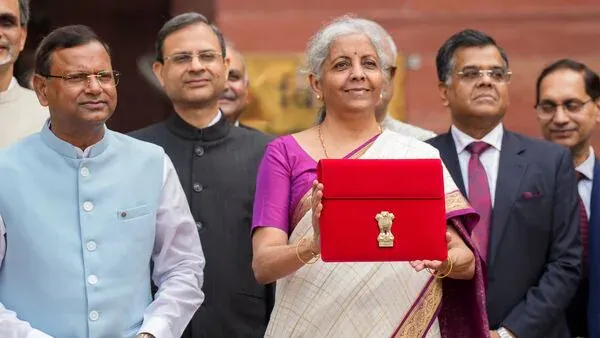Finance Minister Nirmala Sitharaman announced the abolition of the angel tax in the Union Budget 2024-25 for all classes of investors. Additionally, the corporate tax rate on foreign companies will be reduced to 35 percent.
The angel tax, referring to the income tax on capital raised by unlisted companies through off-market share transactions, has been a contentious issue since its introduction in 2012 by then finance minister Pranab Mukherjee. Under Section 56(2) VII B of the Income Tax Act, premiums received on the sale of shares to foreign investors were taxed as “income from other sources.”

Initially implemented to curb fund laundering, the angel tax faced significant opposition from the start-up industry. In April 2018, the government offered exemptions under Section 56 of the Income Tax Act for start-ups with total investments, including angel funding, not exceeding Rs 10 crore. These exemptions required start-ups to obtain approval from an inter-ministerial board and a valuation certificate from a merchant banker, according to the Economic Times.
Investments by venture capital funds or companies in venture capital undertakings were initially excluded from the angel tax. Subsequent government relaxations extended exemptions to DPIIT-recognized start-ups with share capital, including share premiums, under Rs 25 crore. In 2023, further relaxations were provided to investors, including government and related entities, banks, insurance businesses, and investors from 21 specified jurisdictions.
The abolition of the angel tax impacts start-ups, especially those in early stages reliant on external funding, and angel investors who may have been cautious about investing due to tax implications. The industry argued that the angel tax hindered fledgling start-ups by imposing levies on any premium over the “fair market value” of shares, often leading to valuation disputes with tax authorities.
With the removal of the angel tax and a reduction in corporate tax for foreign companies, the Union Budget 2024-25 aims to foster a more conducive environment for start-ups and attract greater foreign investment.
Industry Reacts:

Ankur Mittal, Co-founder of Inflection Point Ventures, expressed optimism about the abolition of angel tax in the Union Budget 2024-25, highlighting the potential for enhanced regulatory clarity that could benefit both domestic and international investors.
“While we have to still read the complete change on the abolishment of angel tax but on the face of it, this action has the ability to bring lot of regulatory clarity which generally is appreciated by the investor communities across the world. This should help founders looking to raise capital both in domestic and international markets,” said Mittal.

Dhananjaya Bharadwaj, Co-founder & CEO of ParkMate, commended the Budget’s measures to address talent retention challenges in startups, emphasizing the positive impact of incentives for EPFO contributions and the simplification of the GST tax structure on the Indian startup ecosystem.
“Retaining talent remains a critical challenge for startups, and the Union Budget 2024-25 has introduced key measures to address this concern effectively. The Finance Minister’s announcement of incentives for both employees and employers regarding EPFO contributions for the first four years will provide much-needed support, creating a more structured and beneficial framework for human resources. Additionally, the proposed abolition of angel tax and the simplification of the GST tax structure are crucial steps that directly benefit the Indian startup ecosystem,” he said.

Maneesh Bhandari, Founder and CEO of Growthpal, welcomed the long-awaited abolition of angel tax, acknowledging the relief it brings to founders and investors alike, freeing up capital and improving the funding sentiment in India.
“A number of industry leaders have been making the case for removing the angel tax and it’s so relieving to see it finally happen. I have personally been through the hassle of giving documentation and explaining the valuation for a number of portfolio companies over the past many years. However, while this was always projected as a challenge for the investors, it’s the founders who struggled the most as they had to provide documentation, deal with the IT department and chase all the investors to provide their documentation, and all this while worrying about possibly losing part of the precious fundraise in the form of the angel tax said Mr.Bhandari

Anil Joshi, Managing Partner at Unicorn India Ventures, lauded the removal of angel tax as a significant step that will boost angel investments in India, alleviate tax burdens, and enhance the funding environment for startups.
“Angel Tax abolishment was long pending, glad that Hon. FM has heard industry voices and has finally abolished it. This will certainly help in expansion of angel investment in India and will take away a lot of burden from the minds of everyone on tax notice for tax paid investment. This will also free up a lot of domestic capital and improve the funding sentiment in a strong way,” he said.

Mayuresh Raut, Managing Partner of Seafund, highlighted the positive impact of abolishing angel tax on startups, emphasizing the potential for increased capital deployment and advancements in energy-related technologies in India. He commented,
“This was an albatross that hindered much needed capital to be deployed to deserving founders. Removal of this dreaded tax will give a huge fillip to startups in the country and free up investors to focus on the investments without having anxiety on how to deal with their implications. A few other things that work well for deep tech focused funds like us. The rooftop solar policy, the pumped storage policy and research and development for small & modular nuclear reactors, Bharat small reactors, R&D for small modular reactors, R&D for new technology in nuclear form a neat troika to alter the energy map of India. Specially on the nuclear side, it positions India to replicate the renaissance that nuclear is experiencing in the US.”

Anirudh A Damani, Managing Partner of Artha Venture Fund, discussed the benefits of eliminating angel tax, emphasizing the simplification of investment processes and the positive implications of tax reforms on the VC, PE, and startup ecosystem in India.
According to him, “The removal of the angel tax will make it significantly easier for us to complete transactions faster and streamline the investment process. Previously, the requirement for income tax officers to understand and assess valuations led to unnecessary conflicts and delays, involving CAs, valuers, and tax officials. Valuation assessments were never meant to fall within the purview of income tax officers, and this change eliminates those complications. This simplification allows us to focus on our primary job—investing in and supporting innovative startups—without the burden of navigating through cumbersome tax regulations.
As a venture capital fund, we see the Indian Budget 2024’s tax reforms as a major boost for the VC, PE, and startup ecosystem. The increase in LTCG tax rate for financial assets to 12.50% and STCG to 20% may pose challenges for listed investments. Still, it’s a significant advantage for other financial products like startups and Alternative Investment Funds. The reduction in LTCG tax from 20% to 12.50% for these investments will result in substantial savings and increased IRR, fostering growth and innovation. While we await the detailed budget, this move is a long-awaited positive development that will make India an even more attractive destination for global investors and drive further growth in the venture capital and private equity sectors.”

Ratna Mehta, Managing Partner at Fundalogical Ventures, underscored the significance of abolishing angel tax in fostering capital flow and innovation in the Indian startup ecosystem, positioning India as a hub for new ideas and sustainable growth amidst evolving tax structures.
“Abolition of angel tax will provide a boost to the budding Indian startup ecosystem. It will encourage the flow of capital without tax leakages, especially relevant at a time when the funding crunch is impacting startup liquidity. It is key to establish India as an innovation hub and leader vs follower for new and breakthrough ideas. Focus of the budget is on sustainable growth with employment generation, of continuity and stability. The changes on the capital gains tax structure was unexpected, especially during a time when the fiscal position of the economy seems to be in check,” she added.
